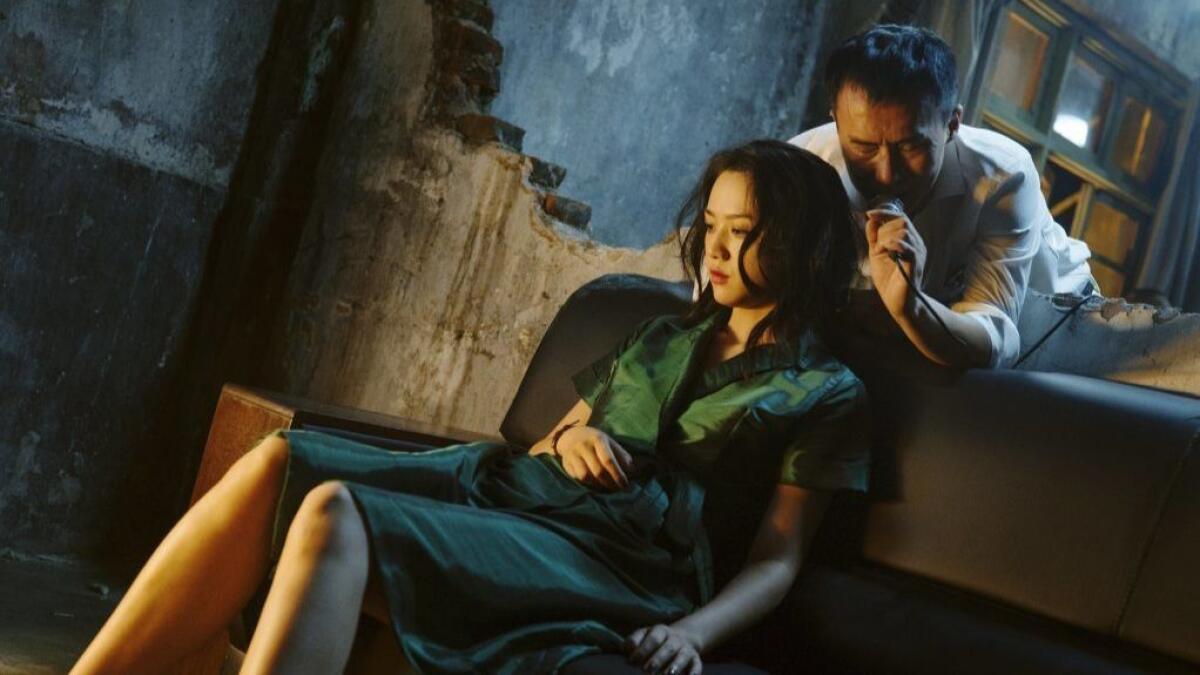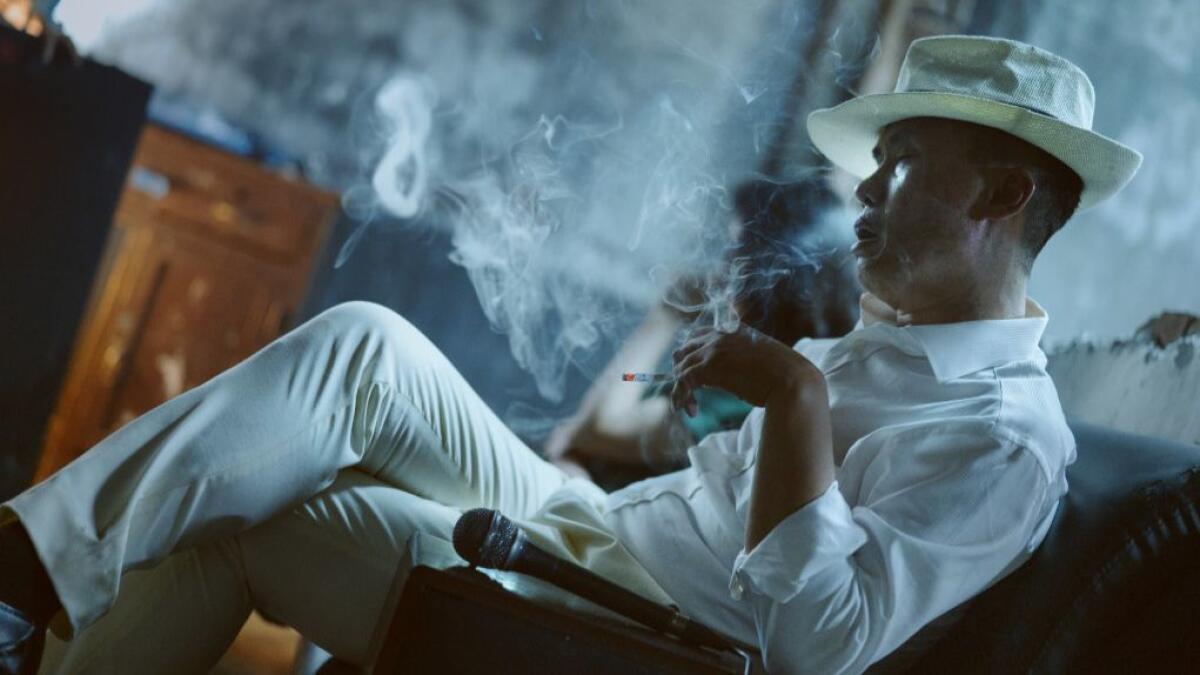Review: Bi Gan’s time-bending noir ‘Long Day’s Journey Into Night’ is a magical piece of filmmaking
- Share via
Good new movies, regardless of what others may tell you, are never in short supply. Enter any theater in Los Angeles and you are more than likely to find one worth your time. What you are less apt to find is enchantment: a picture that succeeds, through some alchemy of dazzling trickery and genuine feeling, in recapturing the pleasures of what was once commonly known as “movie magic.”
But lo and behold, an honest-to-God, how’d-they-do-that enchantment has slipped into theaters this week, and as is fitting for a work of such transparently pure cinema, words seem even less adequate than usual to the task of describing it.
The glory of “Long Day’s Journey Into Night,” a full-body swoon of a movie from the 28-year-old Chinese director Bi Gan, is an ingenious, nearly hour-long sequence that was shot in an unbroken take and then converted to 3-D in post-production. It constitutes the second act and the emotional centerpiece of this moody, mind-bending romantic noir, and it ranks among the great poetic and technical achievements in recent cinema. (While the movie can be seen in standard two-D, the three-D version begins screening this week only at the Landmark, and is strongly recommended in that format.)
But I am getting ahead of myself, which may be fitting for a movie so unbound by temporal constraints. The first half of “Long Day’s Journey Into Night” consists of shorter individual shots and sequences, but its progression is still dizzying, slipping freely and without warning among flashbacks, reveries and present-tense reality. Like an upstart Alain Resnais, Bi treats cinematic time as a toy to be played with, and he has little interest in explaining the rules of his particular game.
At the beginning, whatever that means, an ex-casino manager named Luo Hongwu (Huang Jue) has returned home after his father’s death to Kaili City, in China’s subtropical Guizhou province. (The city also provided the setting of Bi’s beguiling 2015 debut feature, “Kaili Blues,” which anticipates this movie in its fragmentary storytelling and jaw-dropping command of the camera.) As Luo returns to his old stomping grounds — a restaurant run by his stepmother, a tunnel glimpsed through a melancholy sheet of rain, a flooded old building with gorgeous undulating light patterns on the walls — his every forward step draws him backward, inexorably, into the past.

As you have probably guessed, this “Long Day’s Journey Into Night” has little to do with Eugene O’Neill. A more literal translation of the Chinese title would be “Last Evenings on Earth,” which also happens to be the title of a collection of short stories by the Chilean writer Roberto Bolaño — most of them, like this movie, about lonely wanderers on the margins of society. At once a cultural magpie and an unabashed show-off, Bi has structured his movie as a labyrinth of allusions, drawing on such classics of head-trip cinema as David Lynch’s “Mulholland Dr.,” Apichatpong Weerasethakul’s “Tropical Malady” and Andrei Tarkovsky’s “Stalker.”
He owes perhaps his greatest stylistic debt to Wong Kar-wai, the Hong Kong auteur best known for his magnificent art-house romance “In the Mood for Love.” Wong’s influence here is like a pulse, beating steadily beneath those gorgeous surfaces: It’s there in the voiceover that wraps every image in a veil of melancholy; the seductive, near-fetishistic attention to detail; and the undeniable resemblance between Luo and Tony Leung Chiu-wai, Wong’s most famous leading man.
Most of all, it’s there in the directors’ shared obsession with themes of lost time and remembrance. Memories of Luo’s past acquaintances keep resurfacing, including a childhood friend, nicknamed Wildcat, who died years ago at the hands of a local gangster (Chen Yongzhong), and a beautiful former lover, Wan Qiwen (Tang Wei, “Lust, Caution”), who has long since disappeared. It is Wan whom Luo cannot let go of, and you soon realize that whenever she appears, always wearing a green dress, we are lost in the mists of memory.
A sense of disorientation is a wholly appropriate response to a movie in which the past is both irretrievable and unshakable. But even at its most openly baffling, “Long Day’s Journey Into Night” never loses its seductive pull. You learn to follow not the flow of exposition but rather the flow of images, as Bi invests crucial motifs — a broken clock, a pomelo fruit, a book containing a magic spell — with a piercing, almost totemic significance. The flow is sometimes quite literal: From the floods to the rain, there is water, water everywhere, until the production design itself seems to be swimming in tears of regret.

And then, just when it seems to have reached its formal limits, the picture triumphantly slips its own representational bonds. About halfway through, Luo enters a movie theater and dons a pair of three-D glasses, which is your cue to do the same. Immediately you are transported alongside him into a gorgeous nocturnal landscape, gently borne aloft by the steady, graceful movement of the camera. (Yao Hung-i, Dong Jingsong and David Chizallet are credited as directors of photography.) Without blinking or looking away, that camera floats after Luo as he emerges from a dark cavern, rides a motorbike along a road and then ziplines down into a mountain village with a billiard parlor, where still more beguiling encounters await.
“Once you know you’re dreaming, it’s an out-of-body experience,” Lu says at one point, putting words to the act of lucid dreaming. And you have rarely encountered a more lucid dream than this. In contrast with, say, “Gravity” or “Birdman,” which achieved their long traveling shots largely through digital editing and visual effects, this sequence was choreographed and executed, with no small difficulty, in real time. (Comparisons can be drawn to other analog one-take wonders such as Alexander Sokurov’s “Russian Ark” and Sebastian Schipper’s “Victoria.”)
The effect is one of sustained tension and wonderment, a state that compels both heightened attention and woozy surrender. For close to an hour, you watch as this metaphysical Rube Goldberg device plays out, as a succession of formal delights and narrative surprises are harmonized into a single, flowing movement that feels both utterly convincing and thrillingly irrational.
The film theorist André Bazin wrote that a long take, with its depth of focus, could bring “the spectator into a relation with the image closer to that which he enjoys with reality.” That’s true enough of “Long Day’s Journey Into Night,” except that it occupies a space where reality and dream have inextricably merged. Details from the first half turn up mysteriously in the second. A game of table tennis or billiards creates an agonizing logistical and philosophical suspense. Luo meets a woman, Kaizhen, who’s a doppelganger for Qiwen (and also played by Tang), in one of the movie’s more obvious quotations from Alfred Hitchcock’s “Vertigo.”
Are we being told the same story twice, in two equally hypnotic registers of dream logic? Is the second half, a dreamlike emanation from the first, or vice versa? “Long Day’s Journey Into Night” doesn’t just refuse to answer those questions definitively; it asserts that multiple answers — multiple realities — can coexist. In one sublime feat of cinematic prestidigitation, Bi forges new possibilities by which movies can defy the constraints of logic and represent the unrepresentable. When he refuses to cut away, he isn’t just performing a stunt; he’s giving voice to an obsession. He wants the movie to go on forever. He isn’t alone.
------------
‘Long Day’s Journey Into Night’
Mandarin with English subtitles
Not rated
Running time: 2 hours, 18 minutes
Playing: The Landmark, West Los Angeles, and Laemmle’s Playhouse 7, Pasadena
justin.chang@latimes.com | Twitter: @JustinCChang
Only good movies
Get the Indie Focus newsletter, Mark Olsen's weekly guide to the world of cinema.
You may occasionally receive promotional content from the Los Angeles Times.








